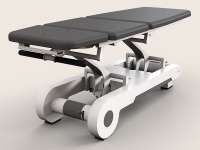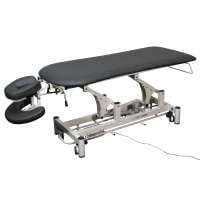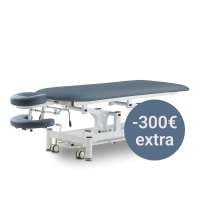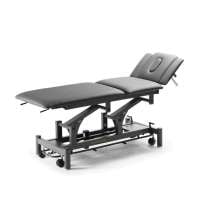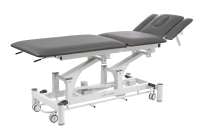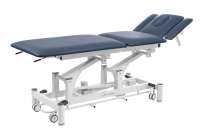
Imagine waking up every morning with a throbbing, piercing pain that accompanies you throughout the day. A pain that burrows into your bones and holds you captive like invisible shackles. This scenario may sound like a cruel nightmare to some, but for millions of people worldwide, it is their reality.
Chronic pain is a complex and widespread problem that can significantly impact your life. Unlike acute pain, which usually serves as a warning signal for an injury or illness and diminishes over time, chronic pain persists and can last for months or even years.
So, how can physiotherapy help in this situation? What treatment approaches are utilized, and what do case studies say? Read on to find out.
-
What is Chronic Pain?
-
Can Physiotherapy Treat Chronic Pain?
-
What Treatments are Suitable?
-
What Do Studies Say?
1. What is Chronic Pain?
The effects of chronic pain on your quality of life are enormous. Everyday activities that others take for granted can become insurmountable challenges for you. These include standing in line, lifting grocery bags, or playing with your children. Moreover, chronic pain can also lead to sleep disturbances, mood swings, anxiety, and social isolation.
Unlike acute pain, which is caused by a specific injury or inflammation and typically heals, chronic pain is long-lasting and often difficult to pinpoint. It can manifest as a dull, persistent ache or intermittent sharp stabs. Chronic pain can affect various areas of your body, such as your back, neck, joints, or muscles.
What lies behind it?
One possible explanatory approach is the concept of "pain sensitivity" or "central sensitization." This involves an increased response of the nervous system to pain stimuli, causing even normal stimuli to be perceived as painful.
It is believed that in chronic pain, the pain signals in the central nervous system are amplified and altered. This means that pain stimuli are perceived more intensely and sustained excessively, even when the initial injury or inflammation has subsided. These changes may be attributed to neuroplastic processes in the brain, which involve the alteration of neural connections and circuits.
Possible causes may include:
-
Injuries: Acute injuries that do not properly heal, such as back injuries, herniated discs, or pinched nerves.
-
Inflammation: Inflammatory conditions like arthritis, fibromyalgia, or inflammatory bowel disease; the persistent inflammatory response can irritate nerve endings and cause pain.
-
Nerve damage: Examples include diabetic neuropathy, nerve injuries, or complications following surgery.
-
Muscle tension and injuries: This can be caused by factors such as poor posture, overexertion, or stress.
-
Psychological factors: Stress, anxiety, depression, and traumatic experiences can contribute to chronic pain.
As a non-pharmacological approach to pain relief, physiotherapy has gained significant importance and offers a promising path to manage symptoms and lead a more active life.

2. Can Physiotherapy Treat Chronic Pain?
The answer is clear: Yes, physiotherapy can play a significant role in relieving chronic pain. Chronic pain is often a complex issue that affects various aspects of the body and mind. Physiotherapy offers a holistic approach to treating chronic pain by focusing not only on pain relief but also on improving functionality and quality of life for the patient.
Non-Pharmacological Approach
One key advantage of physiotherapy in treating chronic pain is that it provides a non-pharmacological approach. This is particularly beneficial for patients who either want to avoid the side effects of pain medications or for whom conventional medication-based therapies have been insufficiently effective. Physiotherapy aims to address the underlying causes of pain and strengthen the body through targeted exercises, manual techniques, and physical therapies.
Through targeted movement and exercise programs, physiotherapy can help improve mobility, strength, and endurance. This, in turn, can lead to a reduction in pain and an improvement in daily functionality. Additionally, physiotherapy can help release muscular tensions often associated with chronic pain.
Understanding Your Body
Another crucial aspect of physiotherapeutic treatment for chronic pain is patient education. Physiotherapists can help you develop a better understanding of your pain by explaining how it originates and how it affects your body. This knowledge can help you better cope with your pain and apply targeted self-help measures to alleviate your symptoms.
However, it's important to note that physiotherapy is typically used as part of a comprehensive treatment plan for chronic pain. Depending on individual circumstances, additional therapeutic measures such as medication, psychological support, or alternative therapies may be necessary. A multidisciplinary approach involving different professionals often proves to be the best strategy for effectively managing chronic pain.

3. What Treatments Are Suitable?
Physiotherapists have various techniques and treatment approaches at their disposal to address chronic pain. Here are some common concepts that can be used in the physiotherapeutic treatment of chronic pain:
-
Manual therapy: This approach includes various manual techniques such as mobilizations, manipulations, and stretches to improve joint mobility and release muscular tension. Manual therapy can be particularly effective for pain in the spinal area, neck, or joints.
-
Strength and stabilization exercises: Targeted exercises to strengthen muscles and improve stability can help enhance body functionality and reduce pain. This can be achieved through strength training exercises, balance training, or specific exercises for the affected area.
-
Posture and ergonomic adjustments: Improving posture and making ergonomic adjustments can help reduce unnecessary stress and strain on the body. Physiotherapists can assist you in learning the correct posture and making workplace, daily life, or sports-related adjustments to minimize pain.
-
Relaxation techniques: Relaxation techniques such as progressive muscle relaxation, breathing exercises, or yoga can help release muscular tension and reduce stress. By reducing stress and tension, chronic pain can often be alleviated.
-
Electrotherapy and thermal applications: The application of electrotherapy, such as TENS (Transcutaneous Electrical Nerve Stimulation), or thermal treatments like heat or cold therapy, can contribute to pain relief, promote blood circulation, and induce muscle relaxation.
-
Patient education and self-management: An essential aspect of physiotherapeutic treatment for chronic pain is patient education. Physiotherapists can help you develop a better understanding of your pain and provide you with tools and strategies for self-managing your pain. This can make it easier to cope with pain in daily life and improve control over your symptoms.
It's important to emphasize that the choice of appropriate techniques and approaches should be tailored to each individual. An experienced physiotherapist will conduct a thorough assessment of your situation to develop a customized treatment plan that meets your specific needs.

4. What Do Studies Say?
Chronic pain is a widespread problem that affects many people worldwide. According to the Global Burden of Disease Study conducted in 2017, an estimated 20% of adults worldwide suffer from chronic pain.
The effectiveness of physiotherapy in treating chronic pain has been examined in numerous studies. A meta-analysis published in the British Journal of Sports Medicine analyzed a variety of research papers and concluded that physiotherapy is an effective method for reducing pain and improving functionality in various types of chronic pain. This study demonstrated the positive effects of physiotherapy in treating back pain, neck pain, and osteoarthritis.
In addition to scientific investigations, there are also numerous patient testimonials reporting the benefits of physiotherapy in treating their chronic pain. Many patients report significant pain relief, improved mobility, and enhanced quality of life after undergoing physiotherapy treatment. This can help them better manage their daily activities and overall well-being.
A holistic approach to the treatment of chronic pain can often yield the best results. Physiotherapy can be combined with other forms of therapy such as medication, psychological support, and alternative therapies in a multidisciplinary approach. This allows for individually tailored and comprehensive care to achieve the best outcomes for the patient.
How did you like the article?
With your feedback, we can improve our content.
❤️ Very interesting! - ☺️ Okay. - ☹️ Not interesting.















